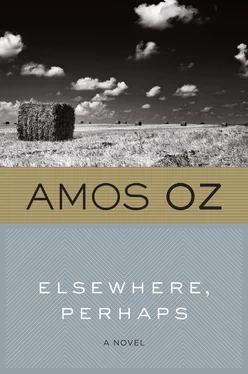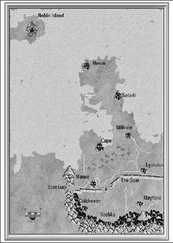Amos Oz - Elsewhere, Perhaps
Здесь есть возможность читать онлайн «Amos Oz - Elsewhere, Perhaps» весь текст электронной книги совершенно бесплатно (целиком полную версию без сокращений). В некоторых случаях можно слушать аудио, скачать через торрент в формате fb2 и присутствует краткое содержание. Год выпуска: 1985, Издательство: Mariner Books, Жанр: Современная проза, на английском языке. Описание произведения, (предисловие) а так же отзывы посетителей доступны на портале библиотеки ЛибКат.
- Название:Elsewhere, Perhaps
- Автор:
- Издательство:Mariner Books
- Жанр:
- Год:1985
- ISBN:нет данных
- Рейтинг книги:4 / 5. Голосов: 1
-
Избранное:Добавить в избранное
- Отзывы:
-
Ваша оценка:
- 80
- 1
- 2
- 3
- 4
- 5
Elsewhere, Perhaps: краткое содержание, описание и аннотация
Предлагаем к чтению аннотацию, описание, краткое содержание или предисловие (зависит от того, что написал сам автор книги «Elsewhere, Perhaps»). Если вы не нашли необходимую информацию о книге — напишите в комментариях, мы постараемся отыскать её.
Elsewhere, Perhaps — читать онлайн бесплатно полную книгу (весь текст) целиком
Ниже представлен текст книги, разбитый по страницам. Система сохранения места последней прочитанной страницы, позволяет с удобством читать онлайн бесплатно книгу «Elsewhere, Perhaps», без необходимости каждый раз заново искать на чём Вы остановились. Поставьте закладку, и сможете в любой момент перейти на страницу, на которой закончили чтение.
Интервал:
Закладка:
As rumor has it, the Goldrings are not a happy couple. Every evening they sit in easy chairs on the darkened veranda, saying nothing, doing nothing. Sometimes Herzl has to go and turn off a sprinkler; he promises Nina not to be long, and he keeps his word. Their house is quiet. The only sounds in the evening come from the radio and from Herzl's accordion. He plays march tunes, to our perpetual surprise. The Goldrings have their supper early, before the dining room gets too full. They greet everyone, strangers included, but it is impossible to engage them in friendly conversation. Herzl agrees blankly to everything you say to him, as if he only wants to be left in peace. Nina reacts with exaggerated concern, as if she is trying hard to make you think she is interested in you, whereas in fact she is only interested in making you believe that she is interested in you.
Herzl takes no part in kibbutz meetings, except to complain from time to time about the destruction of his plants. On such occasions he reddens, wrinkles his nose, and announces indifferently that if they want his resignation, he is prepared to tender it on a moment's notice. If his arguments are accepted, he goes on to say that actions speak louder than words, and leaves the meeting immediately, since the other items on the agenda are no concern of his. If they are not accepted, he states that his resignation takes effect forthwith, and leaves the meeting immediately, for the same reason. But at six o'clock the next morning he shatters the silence of the yard with his lawn mower, as usual, and makes no reference to his threat. Every few days he loses his temper for some trivial reason and snarls an acid "I wish you were dead" at someone, then returns to his customary politeness. Some of our young people, either because of the irritating noise of his lawn mower or for some other reason, nickname Herzl Goldring "the dentist." The title is not witty, and it does not meet with our approval.
Despite everything, he is a wonderful gardener, and his devotion, imagination, and taste have turned our kibbutz into a garden of delights. Thanks to him, we have none of the unsightly plots, beds of weeds, and piles of rubble that you find in the grounds of some kibbutzim. It would be even lovelier if it were not for the mischievous Russians. That has been Herzl Goldring's opinion for many years. They lack the most basic cultured instincts. Is culture a matter of book learning and long words? No. Far from it. No, Reuven Harish, culture is a matter of everyday life, of taking trouble over details, of cultivating a general aesthetic sense. These people walk across the lawns, making ugly bare strips, dump rubbish among the bushes, trample down the young seedlings, and why? Just to take a short cut or out of pure thoughtlessness. How sad that our children, including those of the Germans, pick up this corrupt culture, this false culture. It gets worse every day. Corruption is like bindweed: if you don't eradicate it ruthlessly, it kills everything.
Herzl Goldring looks at you through his sunglasses. His look is embarrassed, not embarrassing, but nevertheless you feel ashamed, you lower your eyes, you stammer an excuse and promise Herzl Goldring never to cut his foliage to decorate your room. But you are bound to break your promise. But why the hell should a man feel ashamed of any step he takes in his own home? Is it any wonder that Herzl Goldring hates you bitterly in the hidden depths of his heart?
Every day at half past four in the afternoon the mail arrives in a red van that announces its presence with a hollow, cowlike blast on its horn. Tsvi Ramigolski gets up from his desk, over which hangs a photograph of his dead brother Aaron. "All right, I'm coming," he murmurs abstractedly, as if someone will hear him and stop hooting. He hurries out into the dusty square in front of the hut. Halfway there, he claps his hand to his forehead and goes back to pick up the outward-bound mail that in his haste he has forgotten. Then he presses through the impatient crowd thronging round the van, exchanges bundles, and shouts out the names of those who have letters. Gai Harish clutches the lucky ones and begs for the stamps. Oren Geva eyes the silver emblem on the hood of the van and thinks inscrutable thoughts. Herbert Segal, meanwhile, receives a new record with religious awe and scrutinizes the writing on the wrapper. Mendel Morag is here, too, to send a parcel of cakes to his relatives.
We live in a small, far-off land, in its northeastern extremity, in a small village a long way from the nearest town. Like all isolated communities, always and everywhere, we love getting letters. Let us imagine that we have the right to peep at letters that are not addressed to us and see what excitements we can espy.
Here, for instance, is a letter from Rami Rimon to his onetime girl friend. It contains no reproach and no words of conciliation. It is a very short letter: the obligatory words of greeting, then a brief description of his preliminary training. What news at home? I'm holding my own, and I've had some pieces of good luck I'll tell you about some other time. Food's not bad. Not enough sleep. One can get used to anything, though. You forget some things and learn others. I hope things on our border don't get too hot before I get there, because I want to be in on the action. Nothing else to report. If you can, say a few nice words to my mother now and then. It must be hard on her. Write to me if you feel like it.
Fruma, too, has had a letter from her son. Rami's letter to his mother is even shorter than the one to Noga. No description of his training, not even a brief one. No mention of the shortage of sleep. All he says is that he is well, that the others in his tent are all pleasant boys, though a mixed bunch, that he's in excellent health. He hopes she isn't mourning for him day and night. He'll come home on leave soon. Finally, as if after reconsideration, he remarks the cookies were lovely, Mom, and it would be nice if you sent me some more.
Fruma, of course, will bake some and send them off very soon. What a pity her relations with other people nowadays are so bitterly quarrelsome.
Dr. Nehemiah Berger writes to his brother and sister-in-law from Jerusalem. He thanks them for being kind enough to invite him to stay. He is almost on his way. No, he is not afraid of the situation on the border. On the contrary, he sometimes finds Jerusalem terribly dreary. He is so bored that he is unable to concentrate on his research, so he is wasting his time on ridiculous translations that earn him his living. What a tragicomic paradox: one earns five times as much for a mechanical translation as for original research. He's not afraid of the heat in the valley, either. Jerusalem may be cooler but it is the dryness that makes him ill and drains the intellectual juices that are vital for creative work. Above all, he confesses to an overpowering longing to see his relatives again. What sort of life do I lead here? No wife, no children, only painful research work, and who can say whether I shall live to complete it? Sometimes I say to myself, Nehemiah, the history of Jewish socialism is a complex structure of wonders and miracles. Who are you to try and plumb its depths? There's one thing I know, and I'll maintain it till my dying day: anyone who says that socialism is an imported plant in our garden doesn't know what he's talking about. We never dissociated our national messianic aspirations from the goal of social salvation. But to prove it one has to explore paths thousands of years old, picking up a fragment here and there, without getting lost in the details and losing sight of the fundamental thesis. It's wearisome work. And who can I talk to about it except to you, my dear Ezra and Bronka, my nearest and dearest, and your dear children? Which reminds me, how is Einav? It can't be long now till the birth. I hope and pray it goes well. Our brother Zechariah sent me a picture postcard. He may be coming over, but he doesn't give any details. Does he write to you regularly? Give my love to Oren and little Tomer — he's probably not so little any more — and to Einav. I'll be on my way to see you soon. All the best. Your loving brother, Nehemiah.
Читать дальшеИнтервал:
Закладка:
Похожие книги на «Elsewhere, Perhaps»
Представляем Вашему вниманию похожие книги на «Elsewhere, Perhaps» списком для выбора. Мы отобрали схожую по названию и смыслу литературу в надежде предоставить читателям больше вариантов отыскать новые, интересные, ещё непрочитанные произведения.
Обсуждение, отзывы о книге «Elsewhere, Perhaps» и просто собственные мнения читателей. Оставьте ваши комментарии, напишите, что Вы думаете о произведении, его смысле или главных героях. Укажите что конкретно понравилось, а что нет, и почему Вы так считаете.












